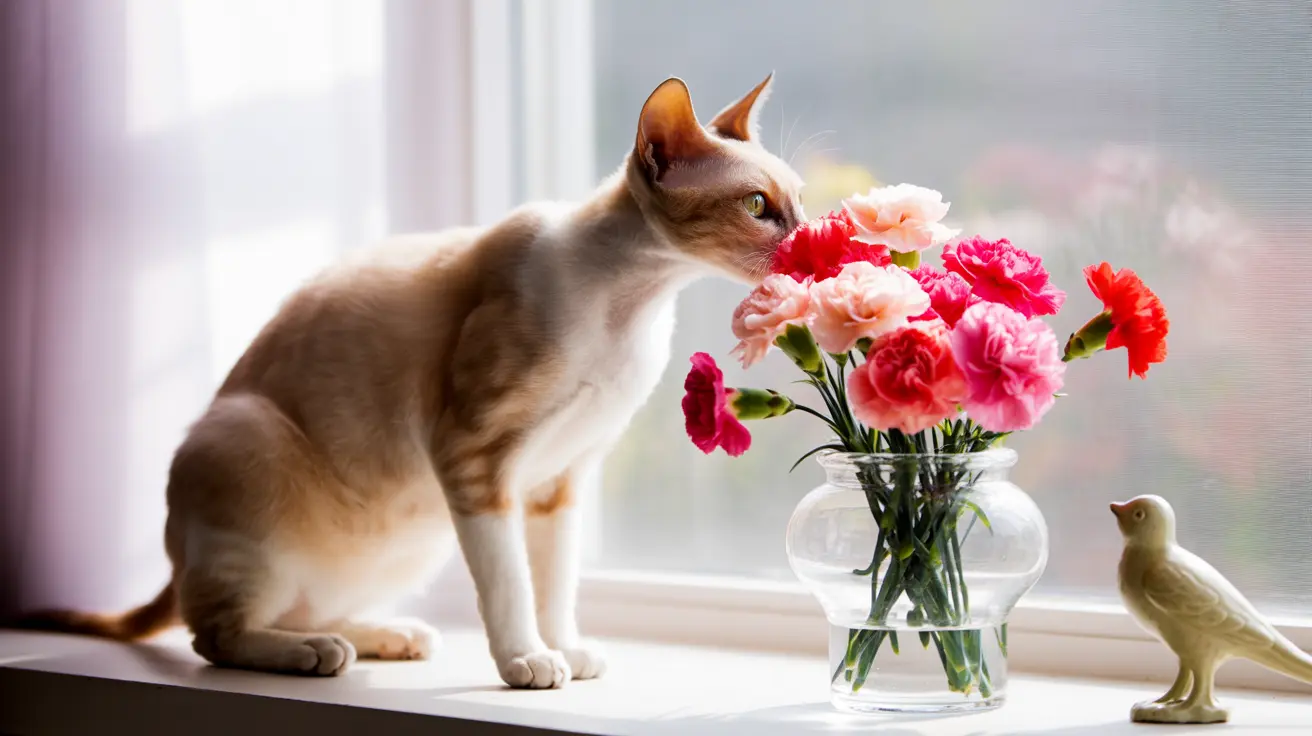Understanding Carnation Toxicity in Cats
Carnations (Dianthus caryophyllus) contain mild toxins that can affect cats when ingested or through direct contact. The entire plant - including flowers, stems, leaves, and sap - contains triterpenoid saponins and other irritant compounds that can cause discomfort in felines.
While carnation poisoning is rarely severe or fatal, it's important to recognize that even mild toxicity can cause significant discomfort for your cat and potentially lead to concerning symptoms.
Common Symptoms of Carnation Poisoning in Cats
When cats come into contact with or consume carnations, they may experience several symptoms:
- Gastrointestinal upset (vomiting and diarrhea)
- Excessive drooling or hypersalivation
- Skin irritation or dermatitis
- Decreased appetite
- Mild lethargy
- Dehydration (in cases of prolonged vomiting)
These symptoms typically appear within a few hours of exposure and usually resolve on their own within 24 hours, provided the exposure was minimal.
Treatment and Emergency Response
If you suspect your cat has ingested carnations or shows symptoms of exposure, take these steps:
- Remove any remaining plant material from your cat's reach
- Gently rinse your cat's mouth with water if plant material is visible
- Monitor your pet closely for developing symptoms
- Contact your veterinarian if symptoms are severe or persistent
In most cases, veterinary treatment focuses on managing symptoms and may include:
- Fluid therapy for dehydration
- Anti-nausea medication
- Gastroprotective medications
- Supportive care as needed
Prevention and Safe Alternatives
The best way to protect your cat from carnation toxicity is through prevention:
- Keep carnations out of reach or opt for pet-safe alternatives
- Consider artificial flowers for decoration
- Create designated "cat gardens" with safe plants
- Maintain an up-to-date list of toxic and non-toxic plants
- Use hanging planters or closed terrariums for toxic plants
Safe Flower Alternatives for Cat Households
Instead of carnations, consider these cat-safe flowers for your home:
- Roses
- Orchids
- Sunflowers
- African Violets
- Spider Plants
- Catnip or Cat Grass
Frequently Asked Questions
Are carnations toxic to cats and what symptoms should I watch for if my cat ingests them?
Yes, carnations are mildly toxic to cats. Watch for symptoms including vomiting, diarrhea, excessive drooling, and skin irritation. While rarely severe, these symptoms can cause discomfort and should be monitored closely.
How should I treat my cat if it eats part of a carnation plant?
Remove any remaining plant material, rinse your cat's mouth with water if possible, and monitor for symptoms. Contact your veterinarian if symptoms become severe or persist beyond 24 hours.
Can contact with carnation sap cause skin irritation in cats?
Yes, carnation sap can cause dermatitis or skin irritation in cats. If your cat comes into contact with the sap, wash the affected area with mild soap and water, and watch for signs of irritation.
How dangerous are carnations compared to other toxic flowers for cats?
Carnations are considered mildly toxic and less dangerous than many other common flowers like lilies, which can be fatal to cats. However, any level of toxicity should be taken seriously.
What preventive steps can I take to keep my cat safe from carnation poisoning?
Keep carnations out of reach, consider pet-safe alternatives, maintain a list of toxic plants, and create cat-safe spaces with non-toxic plants. Always supervise your cat around new plants and flowers.
While carnations may add beauty to your home, being aware of their potential risks to cats is crucial for responsible pet ownership. By taking appropriate precautions and knowing what to do in case of exposure, you can better protect your feline friend while still enjoying beautiful floral arrangements in your home.






